1st Week of Pregnancy
Yes, Pregnancy Journey Begins Before Conception

Baby's Growth and Development at Week One: Preconception
It may seem strange, but your pregnancy journey begins before your baby even is conceived.
The first week of pregnancy actually begins with the start of your last menstrual period. Why? It’s hard to pinpoint exactly when your egg becomes fertilized, but the date of your last cycle is a more accurate starting point. Your doctor will calculate your due date by counting 40 weeks from the start of your last menstrual period.
It’s called the Gestational Age, and it’s how most doctors measure pregnancies. Because ovulation and conception take place about two weeks after your period begins, your baby's Foetus Age (which begins when your egg is fertilized) will be two weeks less than his Gestational Age. So, when you’re 8 weeks pregnant, your baby’s fetal age is 6 weeks.

Your Changing Body at Week One: Preconception
During preconception, your body is preparing for your baby — in fact, it’s been preparing every month since puberty. During every period, your uterus has shed its lining. That creates a new lining that’s rich in blood vessels to house and nourish a developing baby. Now it’s setting the stage for the nine months ahead.

Wellness and Nutrition at Week One: Preconception
You can take action right now to make pregnancy easier for your body and best for your baby in the months to come. During preconception, you can:
- Supplement your balanced diet with daily multivitamins or prenatal vitamins or a maternal milk supplement that include folic acid and other essentials minerals and vitamins needed for pregnancy. Folic acid, which is found naturally in lentils, dried beans, peas, and whole-grain breads, has been shown to help prevent early pregnancy birth defects. Talk with your doctor (Obstetrician and/or Gynecologist) about prenatal vitamins if you haven’t already.
- Establish healthy habits in nutrition and exercise.
- Address any medical conditions. If you're taking prescription medications, you may want to consult your doctor.
- Avoid smoking and alcohol, and limit caffeine to about one tall coffee a day.
Your First Doctor Visit
Many women make a preconception appointment with their family doctor or OB-GYN. This can help you make sure your body is ready for pregnancy. It’s also a great opportunity to ask questions or talk about any special concerns you might have.
Nutrition at Its Best
Be sure to eat a healthy, balanced diet comprising a variety of foods. During the course of your pregnancy, you would need additional folic acid, iron and calcium. Speak to your doctor about prenatal supplements that is suitable for you.
Exercising Now for a Great Start Later
Pregnancy puts extra physical demands on your body. So being physically fit beforehand can help get you and your baby off to a good start.
When you're one week pregnant, a balanced exercise program might be as important as a balanced diet. Try to work all of these into your workout:
- Cardiovascular or aerobic exercise
- Muscular endurance
- Muscular strength or resistance training
- Flexibility exercises
When you?re modifying your exercise routine (or just getting started), remember that:
- Exercises that focus on muscles in your lower back and stomach are particularly good in preparing for pregnancy.
- If you are able to exercise a minimum of 20 minutes a day three to four days a week, you probably will notice significant health benefits.
Many women are concerned about weight gain during pregnancy. Remember that gaining weight is a natural, normal part of being pregnant. Your doctor probably will suggest a weight gain that is best for you. See the weight-gain chart for an example
2nd Week of Pregnancy
Pinpointing Ovulation

Baby's Growth and Development at Week Two: Preconception
There's no baby yet, but your body is preparing for ovulation and, ultimately, conception. Wondering how you can be two weeks pregnant before your baby is conceived? There's an easy explanation.
Conception typically occurs when you are two weeks pregnant, or two weeks after your period starts. Even while you're menstruating, your body is getting ready for pregnancy.
- An egg, maturing within one of your ovaries, releases.
- This process, called ovulation, usually occurs approximately 11 to 14 days after your period.
- After ovulation, the egg moves into your fallopian tube, which connects your ovary and uterus, and waits to be fertilized.
- If you have intercourse during ovulation, you might become pregnant!
- Sperm can live in your body for up to six days, but your egg, once released during ovulation, must be fertilized within 12 to 24 hours.
- At this point, your egg is 1/200 of an inch — too small to see with the naked eye.
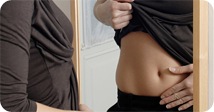
Your Changing Body at Week Two: Preconception
Although conception hasn’t happened yet, your body’s getting ready. Here’s how:
- When you’re two weeks pregnant, a new lining in your uterus is developing and thickening to nourish your baby.
- Your body sends out hormones or chemical signals that release the egg from a follicle in your ovary when the egg is mature.
- When ovulation occurs, your body releases the egg into the fallopian tube. The hormones at work — estrogen and progesterone — cause your body temperature to increase very slightly. You can track this with a basal body thermometer.
- Occasionally during ovulation, the ovary produces more than one egg, which can result in fraternal (nonidentical) twins, triplets, or more, if multiple eggs are fertilized.
Want to know when you're ovulating?
- For most women, ovulation happens about halfway through their monthly cycle. (Ovulation occurs on day 14 of a 28-day cycle.) Consider tracking the date on your calendar for several months if you want to pinpoint when you’re ovulating.
- Look for a slight change in body temperature, which you can detect on a basal body thermometer.
- Check for any change in cervical mucus. At two weeks pregnant, you might notice an increase in mucus that could be white or cloudy. It’s totally normal, but speak with your doctor if you’re concerned.
You could simplify the process with an over-the-counter ovulation predictor kit.

Wellness and Nutrition at Week Two: Preconception
Nutrition
Growing a baby from a single cell into a beautiful newborn draws tremendous energy, nutrients, and resources from your body. A healthy diet can help. At two weeks pregnant:
- Remember, eating the right foods provides enough energy to support you and your growing baby.
- Eat a balanced choice of foods (including proteins, fats, vitamins, and minerals). It helps keep your body healthy.
Try to keep foods in the proper proportions. You can try to mentally divide your plate in half. Vegetables and fruits should make up half of your plate. Proteins and grains compose the other half. And fats? Best to use moderation.
What Is a Prenatal Vitamin?
Prenatal vitamins offer a great way to ensure you're getting all of the nutrition you and your baby will need. Though similar to adult multivitamins, prenatal vitamins often contain levels of vitamins and minerals, such as folic acid and iron, specifically modified to meet the needs of pregnant women. If you prefer to get your additional vitamins and minerals in a food form, consider a maternal milk supplement to support your regular wholesome diet.
Exercise
- Regular exercise as well as a healthy diet before and during pregnancy will help you manage a healthy weight gain as well as help you lose pounds after delivery.
3rd Week of Pregnancy
A Little Zygote Forms

Baby's Growth and Development at 3 Weeks: Fertilization and Implantation
Although you don't know it yet, you might have conceived already! Fertilization occurs when an egg and sperm connect and form a single cell, called a zygote.
Here’s what’s going on during your 3rd week of pregnancy:
- By the 3rd week of pregnancy, the microscopic-sized zygote divides again and again, growing at an astounding pace in your baby.
- At 3 weeks pregnant, your baby already has all of the genetic material she needs for life — half of the 23 pairs of chromosomes from you and half from your partner.
- Your baby's sex already is determined.
The Great Divide
Approximately 12 hours after fertilization, your baby — right now only a one-celled zygote — divides into two identical cells. These two cells each split, creating four cells, which then split to become eight. This continues as the total number of cells in your baby doubles every 12 hours.
If a single zygote splits into two identical zygotes, each with the same genetic makeup, identical twins occur.
During your 3rd week of pregnancy, your zygote is moving down the fallopian tube to your uterus.
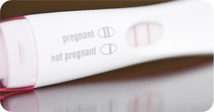
Your Changing Body at 3 Weeks Pregnant: Fertilization and Implantation
You’re 3 weeks pregnant now, but it's too early for you to have missed your period or to experience any symptoms.
Here’s what’s happening inside during your 3rd week of pregnancy:
- At 3 weeks pregnant, your baby is in the blastocyst stage. Your developing placenta begins producing hCG (human chorionic gonadotropin), the hormone that’s detected in your blood or urine to tell you that you’re pregnant.
- A home pregnancy test can detect this hormone about six to 12 days after fertilization.
- Only two weeks after your cycle, your uterus is thick with a rich blood supply — ready to accept and nourish your fertilized egg.
- In the 3rd week of pregnancy, your baby implants in the lining of your uterus and you might notice spotting. You even could mistake this for the start of your period. This spotting might be the first real sign that you're pregnant! It usually only lasts one to two days and is lighter than your normal period.

Wellness and Nutrition at 3 Weeks Pregnant: Fertilization and Implantation
Exercise
If you’re already in good condition and regularly exercising, pregnancy doesn’t prohibit you from keeping on with a safe exercise routine.
At 3 weeks pregnant, just remember:
Drink plenty of fluids.
- Respond right away if your body indicates that you should slow down or even stop.
- Avoid smoking, alcohol, medications, or exposure to chemicals.
Nutrition for Two
Even earlier than the 3rd week of pregnancy, how well you eat and care for yourself makes a big difference in the quality of nutrition your baby receives.
What Do the Nutrients in Your Food Do?
- Calories help nourish your growing baby.
- Iron and folic acid help make the extra blood needed during pregnancy.
- Protein helps produce blood and builds your baby's tissues and muscles.
- Calcium builds your baby's bones and teeth.
4th Week of Pregnancy
Congratulations!
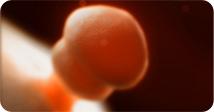
Baby's Growth and Development When You're 4 Weeks Pregnant
This is it — the week you’ll likely miss your period and find out you're pregnant!
By your 4th week of pregnancy, your baby probably has embedded in your uterus and is growing at an amazing rate. Here’s what’s going on at 4 weeks pregnant:
- When you’re 4 weeks pregnant, your baby’s body now has three distinct layers from which all of his organs will develop.
- From the 3rd week of pregnancy to the end of the 4th week of pregnancy, your baby grows to the length of the head of a pin — about 1/25th of an inch long.
Your Placenta's Amazing Role
During the 4th week of pregnancy, the placenta, which will carry nutrients from you to your baby, begins to form. It’s made primarily from your baby's tissues, with the help of cells from your body. Here’s a look at what it does:
- At 4 weeks pregnant, the placenta continues to thicken until the fourth month of pregnancy.
- The placenta actually matches the needs of your baby with the nutrients available from you to give him the specific nutrients he needs at the time.
- Although it’s made up of shared tissue, the placenta does not allow blood from your body and your baby's to come in direct contact.

Your Changing Body at 4 Weeks Pregnant
Four weeks into your pregnancy you've missed your period. Time to test! You might be eager to find out if you have a little one on the way. Learn more about pregnancy tests:
- Your home pregnancy test measures a hormone (hCG (human chorionic gonadotropin)) that your body produces after a fertilized egg attaches to the wall of your uterus (usually six to 12 days after fertilization).
- Most pregnancy tests recommend waiting to test until at least the first day of your missed period.
- The longer you wait after your missed period, the more accurate the test will be.
- Testing too early could result in a false-negative reading of a still-developing pregnancy.
What’s the Best Time to Test?
- Early in the morning when you urinate for the first time. The hCG hormone is at its highest level then. This is the same hormone your doctor will check to confirm that you’re pregnant. These hCG hormone levels double every two to three days throughout your first 10 weeks of pregnancy.
- Your doctor might choose to check these levels in a series of tests to confirm how your early pregnancy is progressing.
- If you test negative, but you notice other pregnancy symptoms, wait a few days and test again
How accurate are home pregnancy tests
Most tests can diagnose 90% of pregnancies on the first day of the missed period. Wait one week after your missed period and tests jump to 97% accuracy.
Fourteen days after conception, you’re officially 4 weeks pregnant. In addition to the hormones, there’s a lot going on with your body:
- Around your 4th week of pregnancy, the uterus begins to thickenand line with blood vessels to nourish your growing baby.
- Your cervix, the opening in your uterus where your baby ultimately will emerge, probably begins to soften and change color. Your doctor may check for this to confirm your pregnancy at your first appointment.
- Tender breasts are often one of the first changes that signal that you have a baby on the way. This tenderness usually goes away after the first few months. Your breasts might seem heavier or full.
- At 4 weeks pregnant, you even might notice a few of the othersigns of early pregnancy before you even take your pregnancy test.
- Emotionally, you might both be thrilled and worried — or both all at once. The emotions are different for each woman, but it is common to experience a full range of them.

Wellness and Nutrition at 4 Weeks Pregnant
Congratulations! Wondering when to share the big news with others? There's no right or wrong time. It’s up to you and your partner to decide when it’s right for you to share the news. You might want to consider these Tips for Sharing Your Big News at Work.
Looking Ahead
Your pregnancy is divided into 40 weeks, or nine months, or three trimesters.
- The 1st trimester includes weeks one through 12.
- The 2nd trimester includes weeks 13 through 28.
- The 3rd trimester includes weeks 29 through 40.
Scheduling With the Doctor
- If your home pregnancy test came back positive, you might want to schedule an appointment with your doctor. Most doctors will schedule the appointment between your 6th and 10th week of pregnancy. To help you get ready for that first appointment, see our 1st Prenatal Visit Checklist.
- Becoming informed is an important part of a healthy pregnancy. But it might seem that health warnings and pregnancy recommendations are always changing. Advice now might even conflict with what you’ve learned before. Always consult with your doctor about any questions.
Exercise — Your Pregnancy in Action
- You’ve just received great news and might be a little cautious about doing things that could hurt your baby, especially in these early weeks and months.
- At 4 weeks pregnant, regular exercise will continue to strengthen your body. This will help your body become better prepared to contribute to the health of your baby.
Nutrition During Your 4th Week of Pregnancy
- Drinking enough fluids is most important early in your pregnancy. Your body begins to increase blood flow and your baby needs more fluids. Drinking enough fluids also can help you fight fatigue and possible constipation.
- Choose water or nutritious drinks, such as skim milk or whole fruit juices.
5th Week of Pregnancy
The Tip of a Pen
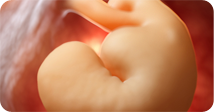
Baby's Growth and Development at 5 Weeks Pregnant
After weeks of rapid cell development, your baby takes on a more distinct form. During the 5th week of pregnancy, here’s what’s happening inside:
- Her heart and circulatory system take shape — a bulge indicates where your baby's heart is developing. By the end of the 5th week of your pregnancy, your baby's earliest blood vessels form.
- Around the 5th week of your pregnancy, your baby's heart begins to beatand might be visible on an ultrasound.
- The umbilical cord replaces the yolk sac. The umbilical cord works with the placenta to bring nutrition and oxygen to your baby and remove waste.
- When you’re 5 weeks pregnant, your baby is the length of the tip of a pen, about 1/17 of an inch, and growing rapidly every day.

Your Changing Body at 5 Weeks Pregnant
Although later pregnancy is more dramatic to the world externally, the first weeks of pregnancy include the most dramatic internal changes for you. All of the systems in your pregnant body change to help your new baby develop. During your 5th week of pregnancy, you might start to notice the following:
Feeling fatigued? Your body produces more blood to carry oxygen and nutrients to your baby. Your increase in blood might be especially high at 5 weeks pregnant, placing demands on your circulation. Your heart rate increases to keep pace, and these changes might cause fatigue, dizziness, or even headaches.
At 5 weeks pregnant, you might be experiencing a few other symptoms of early pregnancy. This can include breast changes, nausea, heightened sense of smell, frequent urination, or mood swings.
Most women start to feel symptoms at 5 weeks pregnant. But every pregnancy is unique. Some symptoms might come later or not at all.
Around the 5th week of pregnancy, the placenta that will help nourish the baby grows and secures to the uterus, which might cause light spotting.
By 5 weeks pregnant, you might find that odors from your daily routine can cause nausea. You might want to identify the source and avoid smells that bother you.
If you experience dramatic mood swings in early pregnancy, you’re not alone. You might want to share your feelings and get the emotional support you need from your partner, family, and friends.

Wellness and Nutrition at 5 Weeks Pregnant
Making the Most of Your Doctor Visits
Regular prenatal care remains a critical part of monitoring your health and the health of your baby throughout your pregnancy. Now is the time to schedule your first prenatal visit. Most doctors will schedule the appointment between your 6th and 10th week of pregnancy.
- Your first prenatal doctor visit will be one of the most involved. During this visit, your doctor confirms your pregnancy and records your medical history. Your doctor probably will conduct a physical exam and a series of additional routine tests to make sure you and your baby are healthy.
- Good communication is a key to success with your health care provider. If you don't understand something at any doctor visit, be sure to ask for clarification or additional details.
- Get informed and be equipped. The more informed you are, the better able you’ll be to make the best choices throughout your pregnancy.
- Look beyond the belly. Remember to keep up with other areas of your overall health. Schedule routine dental visits and promptly address other health concerns as they arise.
Exercise: Finding the Right Routine for You
Exercise supports good health for you and for your baby. Plus, healthy habits today lay the groundwork for your future labor and delivery. Check out a few simple pointers that might help you find the right routine:
- Talk with your doctor about changes in your exercise program or health routine.
- Equip yourself for exercise success with the right shoes and a sports bra with plenty of support.
- Don't skip the stretch! Begin and end with stretching to prevent muscle strain.
- Rise slowly if lying or sitting to keep from feeling dizzy or faint.
- Try for 30 minutes of physical activity or exercise most days of the week.
You might find that some types of exercise relieve pregnancy-related aches and pains. Try stretching, walking, swimming, water aerobics, cycling on a stationary bike, low-impact aerobics, or low-impact cardiovascular machines. Experiment to find the routine that works best for you.
Nutrition Notes
Pregnancy is one of the best times to pump up your nutritional intake, because your choices now affect both you and your baby. During your 5th week of pregnancy:
6th Week of Pregnancy
All Systems Go!
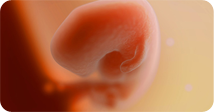
Baby's Growth and Development at 6 Weeks Pregnant
During your 6th week of pregnancy, your baby grows at a phenomenal rate and his systems develop significantly. Here’s what’s happening at 6 weeks pregnant:
- Your baby, now called an embryo, is clearly visible on ultrasound. He is about 1/8 of an inch long, about the size of a grain of rice.
- When you’re 6 weeks pregnant, his nervous system and all major body organs — heart, kidneys, liver, and lungs — are the first to form.
- Facial features — jaw, cheeks, chin, ear canals, nose, and eyes — begin to develop around the 6th week of pregnancy.
- You baby’s heart beats about 80 times per minute and gets faster each day.

Wellness and Nutrition at 6 Weeks Pregnant
What’s your due date? How is your pregnancy progressing? What can you expect in the coming weeks? There are many questions at this early stage of pregnancy. That’s why it’s time to begin prenatal visits with your doctor.
This prenatal visit checklist can help you get ready.
- Your medical history:
- Date of last period ___________________
- Contraceptive use ___________________
- Prescriptions ___________________
- Allergies ___________________
- Medical conditions ___________________
- Exercise ___________________
- Nutrition habits ___________________
- Your due date. Knowing your due date helps your doctor more accurately monitor your progress and baby's growth.
Due date: _______________________________________
- Baseline tests:
- Weight ___________________
- Blood pressure ___________________
- Heart rate ___________________
- Urine and blood lab work
- A pelvic exam and possibly a Pap test
- Your questions:
_________________________________________________
________________________________________________-
_________________________________________________
Exercising During Pregnancy
The benefits of exercise go beyond you and your baby's overall health. Exercise during pregnancy has been shown to:
- Offset varicose veins, leg cramps, fatigue, bloating, swelling, and constipation
- Maintain muscle tone
- Minimize lower-back pain and improve posture
- Increase energy
- Help you relax and sleep
Using Nutrition to Manage Morning Sickness
If you have nausea and vomiting, you can find relief. Here are a few things to try:
- Eating small meals or snacks frequently throughout the day
- Limiting or avoiding greasy, spicy, or fried foods
- Drinking fluids to stay hydrated, especially if you are vomiting
- Indulging healthy cravings
It also might help to:
- Avoid those odors in your daily routine that make you queasy.
- Get enough sleep and rest.

Your Changing Body at 6 Weeks Pregnant
Like your developing baby, your body experiences many changes during your 6th week of pregnancy.
- Hormones begin to increase. They include elevated levels of estrogen and progesterone, hCG (human chorionic gonadotropin) — the hormone that indicates pregnancy, and HPL (human placental lactogen) — the hormone that promotes baby’s growth.
- As hormones increase during your 6th week of pregnancy, your body might react both physically and emotionally.
- By your 6th week of pregnancy, common pregnancy symptoms include nausea and vomiting, aka morning sickness, which for many might not be limited to the morning. You also might experience mood swings.
- At 6 weeks pregnant, some women also notice other symptoms when they’re pregnant. These could include changes in your breasts, headaches, faintness or dizziness, increased urination, insomnia, fatigue, excess saliva, constipation, food aversions or cravings, and emotional changes.
- If any pregnancy symptoms feel extreme, it’s a good idea to speak with your doctor. Also, don’t be concerned if you aren’t experiencing any of these symptoms or don’t “feel” pregnant. Every woman’s body is different.
- Spotting or vaginal bleeding also can occur during the first 12 weeks of pregnancy. As many as 40% of pregnant women may experience some bleeding. Check with your doctor if you’re concerned about spotting or bleeding.
Your Pregnancy Week 7
A Tiny Person Emerges
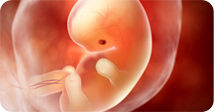
Baby's Growth and Development at 7 Weeks Pregnant
During the first 6 weeks of pregnancy, your baby’s heartbeat was the big story. At 7 weeks pregnant, the most exciting event is your baby’s developing facial and physical features. Highlights for your 7th week of pregnancy include:
- By the 7th week of pregnancy, she is 1/3 of an inch to half an inch long now — barely the length of your pinky fingernail.
- Your baby’s face becomes more defined when you’re 7 weeks pregnant. Her mouth, nostrils, and ears begin to appear.
- When you’re 7 weeks pregnant, the lenses in your baby’s eyes begin to form and the iris color is visible.
- Her arms, shoulders, hands, legs, and feet begin to take shape by the 7th week of pregnancy, with the early formation of fingers and toes just another week away.
- Around the 7th and 8th week of your pregnancy, your baby’s body elongates and her neck straightens.
- Your baby’s brain becomes more complex during the 7th week of pregnancy. The skull that’s growing to protect it is transparent and rounding.

Your Changing Body at 7 Weeks Pregnant
Your body continues to undergo lots of change to support your growing baby during the 7th and 8th weeks of pregnancy. Here’s what’s going on:
- Your hormone production increases during the 7th week of pregnancy.
- You might continue to experience some of the common symptoms of pregnancy such as breast tenderness, fatigue, or faintness.
- You might feel like you have PMS (Premenstrual Syndrome) with youremotional ups and downs.
- By the 7th week of your pregnancy, a mucous plug now blocks the cervical canal, helping prevent germs from getting into your uterus. The mucous plug will pass late in pregnancy.

Wellness and Nutrition at 7 Weeks Pregnant
Nutrition, exercise, and rest are essential parts of a healthy pregnancy. Practicing good habits now will help you throughout pregnancy, during labor and delivery and beyond.
Exercise for Yourself and Your Baby
If you’re already active by the 7th week of your pregnancy, you’re off to a great start. If you haven’t been as active as you’d like to be, this is a great time to get going. And remember:
- Dietary Guidelines for Americans recommends 30 minutes or more of moderate-intensity physical activity all or most days of the week. Try for 30 minutes of physical activity or exercise a day.
- You can break up exercise into small segments throughout the day or do it all at once.
- Pregnant women with medical or obstetric complications should speak with their doctors about an exercise plan.
Nutrition
Between the 5th and 8th weeks of pregnancy, nutrition plays a huge role in developing your baby’s nervous, digestive, respiratory, circulatory, and reproductive systems. At 7 weeks pregnant, continue to make nutrition a priority by following these tips:
- Nausea, vomiting, heartburn, indigestion, and other changes in your digestive system can make eating a little challenging. Try:
- Eating smaller, more frequent meals
- Limiting foods that may irritate your digestive systems
- Drinking plenty of fluids, especially water
- Double your iron intake. Increased blood volume during pregnancy and the demands of your growing baby put pregnant women at higher risk of iron deficiency or anemia. Include iron-rich foods such as leafy greens, beef, eggs, and nuts in your diet. Prenatal supplements also include extra iron.
- Keep taking prenatal supplements. They provide an extra source of iron, folic acid, and other important vitamins and minerals. Remember that prenatal supplements are not a substitute for a healthy diet.
8th Week of Pregnancy
Tiny Fingers and Toes
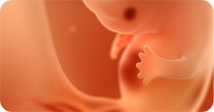
Baby's Growth and Development at 8 Weeks Pregnant
When you’re between 7 and 8 weeks pregnant, your baby’s body parts and proportions continue to develop and change quickly. Here’s what’s going on during your 8th week of pregnancy:
- At 8 weeks pregnant, your baby is more than a half an inch long — around the length of a lima bean.
- Your baby’s tiny fingers and toes develop.
- His arms and legs grow longer.
- By the 8th week of your pregnancy, his wrists, elbows, and ankles are visible.
- His eyelids form and ears, upper lip, and nose tip become more defined.

Your Changing Body at 8 Weeks Pregnant
At 8 weeks pregnant, your body continues to show signs of the many changes ahead. Emotionally, the joy of finding out you’re pregnant may give way to feelings of anticipation, anxiety, or fear. It’s totally normal. Try to put your mind at ease by talking with your doctor about your concerns and by making good choices that support your health and wellness long term.
Here’s what’s going on during your 8th week of pregnancy:
- Your breasts enlarge as the milk-producing glands grow.
- Your uterus enlarges inside your pelvis as your baby grows during the 8th week of pregnancy.
- At 8 weeks pregnant, your cervix continues to soften as it will throughout pregnancy to prepare for childbirth.

Wellness and Nutrition at 8 Weeks Pregnant
What should you avoid during pregnancy? Most doctors agree that you’ll want to stay away from:
- Activities that could cause you to fall, or put pressure or force on your belly
- Overly vigorous, intense exercise — if you're too out of breath to talk, you're probably exercising too hard.
- Alcohol, smoking, and caffeine (ask your doctor about how much caffeine you should have daily, if any)
- Saccharine and herbal sweeteners (ask your doctor if artificial sweeteners are OK)
- Certain over-the-counter and prescription medications (talk with your doctor about what’s OK during pregnancy)
- Exposure to chemicals and fumes from paints, cleaning products, and solvents. Latex, or acrylic, paint generally is considered to be safe. But check with your doctor so you can safely and confidently help with the nursery or other projects around the house.
- Saunas and hot tubs
- Chemical treatments for your hair, such as dye and perms
9th Week of Pregnancy
Hormones Shifting Gear
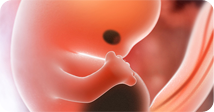
Baby's Growth and Development at 9 Weeks Pregnant
When you’re 9 weeks pregnant, your baby’s body parts and proportions continue to develop and change quickly:
- During the 9th week of your pregnancy, your baby grows to about one inch, or about the length of an olive.
- By your 9th week of pregnancy, your baby’s skeleton begins to harden. Hardening of the bones (ossification) begins with the formation of cartilage.
- Her fingers, toes, knees, and elbows develop.
- Nipples and hair follicles form.
- Her intestinal system — pancreas, bile ducts, gallbladder, and anus — forms. Her intestines elongate.
- Your baby’s reproductive organs begin to develop internally when you’re 9 weeks pregnant.
- Muscles develop and your baby may start to move — you may feel her movements in several more weeks.

Your Changing Body at 9 Weeks Pregnant
Welcome to the last month of your 1st trimester. At 9 weeks pregnant, your body continues to change to protect and nourish your developing baby. That means thatpregnancy symptoms still might be in full force. Take a look at some of the changes happening during your 9th week of pregnancy:
- Hormone production increases around the 9th week of pregnancy, but a shift occurs by the 12th week of pregnancy, signaling the relief of many 1st-trimester pregnancy symptoms. Until then, continue to seek relief from symptoms that bother you.
- Some symptoms include nausea, vomiting, breast soreness, increased urination, insomnia, and vivid dreaming.
- Your heart pumps harder and faster, which can cause fatigue, dizziness, and headaches.
- Increased estrogen and progesterone stimulate the growth of your breasts and milk glands. The skin around your nipples may enlarge and darken.Breast soreness and fullness is normal. Consider shopping for asupportive and comfortable bra to accommodate your changing breasts.
- Your body shape begins to change, which also can cause you to change how you feel about your body. Remember that body changes and healthy weight gain are important but temporary aspects of pregnancy. Take the steps you need to maintain a positive body image by exercising and eating well. Wear comfortable clothes that make you feel and look good. Don’t worry if you are not showing just yet — it may take a few more weeks.

Wellness and Nutrition at 9 Weeks Pregnant
The ongoing, rapid changes at 9 weeks pregnant make exercise and nutrition an important part of you and your baby’s health. You also can look forward to your second doctor’s visit and possibly hearing your baby’s heartbeat in the coming weeks. And get those scrapbooks ready — you’ll get the first glimpse of your baby during your first ultrasound soon.
Your 2nd Doctor Visit
- You’ll probably have your second prenatal visit sometime between the 9th and 12th weeks of pregnancy.
- It might be shorter than your first prenatal visit but will include a check on many of the same vitals:
- Weight
- Blood pressure
- Urine for sugar and protein
- Uterus size
- Height of fundus (the top of the uterus)
- Your questions or concerns
- Your doctor will use a special listening device, called a Doppler, to project the sounds of your baby’s beating heart.
Nutrition Benefits for You and Your Baby
Being pregnant puts a new perspective on how your health habits can affect your body and your baby. Consider just a few of the many benefits of good nutrition during pregnancy:
- A healthy diet supplemented with folic acid can help prevent birth defects.
- Good habits now will help you maintain them throughout your pregnancy.
- According to research, good nutrition can protect your baby after birth from diseases.
Exercise Benefits You and Your Baby
Regular exercise also offers both you and your baby lots of benefits, including:
- Helping alleviate common problems of pregnancy. These include:
- Backaches
- Bloating and swelling
- Increased fatigue
- Toning the muscles in your stomach, uterus, and vagina
- Supporting good metabolism
- Helping you get back into pre-pregnancy shape sooner
- Helping improve delivery of oxygen and nutrients to your baby
- Improving your energy levels
- Helping you feel better physically and emotionally
- Adjusting to a new center of gravity
- Possibly coping better during labor
10th Week of Pregnancy
Baby Smarts
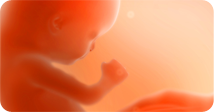
Baby's Growth and Development at 10 Weeks Pregnant
It’s official! After weeks of life as an embryo, by the end of the 10th week of your pregnancy, your baby becomes a foetus*. Here are some of the other changes your baby is going through during your 10th week of pregnancy:
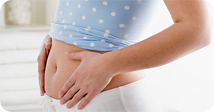
Your Changing Body at 10 Weeks Pregnant
Like your baby, your body also is continuing to change. At 10 weeks pregnant, you might notice that:
- You experience pressure in your lower abdomen. Most likely, you’re feeling your uterus starting to grow or sensing increased blood flow. This pressure also might cause you to urinate more often.
- During the 10th week of pregnancy, you might notice some changes with your eyes:
- The outer layer of your eye — the cornea — gets slightly thicker. This is due to fluid retention during pregnancy.
- Dry eyes or puffy eyelids also might occur during pregnancy.
- These symptoms are temporary and your eyes return to normal after you give birth.
- Speak with your doctor if eye changes seem intense, if you see spots, or if blurred vision occurs suddenly. Your doctor might want to check your blood sugar or blood pressure for diabetes or high blood pressure. These symptoms might not occur at all. If they do, they are only a temporary symptom of pregnancy.

Wellness and Nutrition at 10 Weeks Pregnant
Nutrition at 10 Weeks Pregnant: Striving for a Healthy Balance
By choosing good foods from all of the food groups, you’re nourishing your baby with a broad range of different nutrients.
| Food Groups |
Recommended number of servings per day |
|---|
Rice and Alternatives
(Do include the recommended whole-grain serving as part of the Rice and Alternatives serving needs.)
Whole-grains |
6-7
3 |
| Fruit |
2 |
| Vegetables |
3 |
| Meat and Alternatives |
2 1/2 |
Milk
(Do include the recommended milk serving in addition to the Meat and Alternatives serving needs.) |
500 ml |
It is also important to limit food that is high in fat, salt and sugar and ensure that
you get a good mix of vitamins and minerals.
- When your baby is growing at his fastest, add about 300 calories a day to your diet. That's equivalent to a bagel, an egg with toast, a banana with milk, or slightly larger portions of your normal meals.
Exercise During Your 10th Week of Pregnancy: Finding New Ways to Move
Moderate physical activity 30 minutes a day, most days of the week, is considered safe and beneficial to pregnant women and their babies. Someexercises to consider:
- Aerobics promote circulation, heart and lung stimulation, muscle tone, and joint health. Examples include walking, bicycling, jogging, and swimming.
- Light weight training supports muscle tone, strength, and endurance. Use light weights and avoid straining your body.
- Water exercises ease stress on your body and reduce overheating. Examples include swimming and water aerobics.
- Yoga supports relaxation, flexibility, breathing, and posture. It can build strength and increase endurance.
- Pilates helps improve posture and build muscle strength, breathing, and flexibility
- Cross-country skiing
- Golf
- Bowling
11th Week of Pregnancy
Are You Glowing Yet?
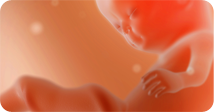
Baby's Growth and Development at 11 Weeks Pregnant
By the 11th week of your pregnancy, all of your baby’s organs are in place. She’s ready to focus on growth, growth, growth! At 11 weeks pregnant:
- When you’re 11 weeks pregnant, your baby is about 1½ inches long, about the length of your thumb from the knuckle to the tip.
- From now until your halfway mark at 20 weeks of pregnancy, your baby willincrease her weight by 30% and probably will triple in length.
- The blood vessels in your placenta grow larger to prepare for this time of accelerated growth in your baby.
- During the 11th week of your pregnancy, your baby's ears move to their permanent position.
- Your baby's reproductive organs are developing. But it’s still a little early to find out whether it’s a girl or boy — gender isn’t clear on ultrasound until between the 16th and 20th weeks of pregnancy.

Your Changing Body at 11 Weeks Pregnant
During your 11th week of pregnancy, your baby begins to grow more rapidly and your body keeps on adjusting to the changes ahead.
- Pregnancy glow? Yes, it's real! You've heard that expectant mothers almost glow and you might be experiencing this yourself. This "glow" is thanks to your increased blood volume, which can cause skin to look slightly flushed and full. In addition, your body's hormones increase the amount of oils on your face, causing skin to look smoother with a slight shine. At this point you might want to consider switching to oil-free skin products, if you haven’t already.
- Your uterus continues to expand during the 11th week of pregnancy to accommodate your baby's increasing size. You might even experience light twinges as this expansion continues.
- By the 11th week of pregnancy many of the early symptoms of pregnancy, such as nausea, might be less severe.
- Acne also can be an issue for pregnant women. As your body's increased oils provide your pleasant pregnancy glow, they also leave you more susceptible to acne. The good news? It's only temporary and should disappear after you give birth.
Dealing With Acne During Pregnancy
It sounds a little bit like the advice you got when you were 14, but it holds true now. You usually can prevent or control most acne issues during pregnancy with sensible skin care:
- Wash your face two to three times a day with a gentle cleanser. Remember, your skin is more sensitive during pregnancy so if you aggressively scrub, it might irritate your skin further.
- Be sure anything that touches your face is clean, including your hands. Try to keep your hair clean and off your face.
- Make sure all of your moisturizers, skin care, and cosmetic products are oil-free. You might have to pitch a few favorites for now.
- Drink as much water as you can and make healthy eating choices. You'll have a healthier body and clearer skin.
- Be sure to check with your doctor before using any acne medications. Some can be dangerous for your baby.

Wellness and Nutrition at 11 Weeks Pregnant
When you’re 11 weeks pregnant, eating healthy, exercising regularly, and restingstill top the list for keeping you and your baby healthy. And it’s OK to be tired or feel exhausted — most women are more tired than usual while they’re pregnant. Your body works hard to produce hormones and more blood to support your baby's developing body. And your body's high level of progesterone directly impacts how sleepy you are.
Here are a few tips for fighting fatigue:
- Remember to rest! It sounds simple, but you might be tempted to do more, not less, during this exciting time. Your body needs those naps or extra hours of sleep, so be sure to build them into your regular routine.
- Watch your own back. Avoid taking on extra commitmentsduring this time.
- Ask for help when you need it, whether it's around the house, on the job, or during your other activities.
- Stay active. It might be hard to get motivated to move, but remember regular physical exercise will leave you feeling more energized.
- Eat a balanced diet. It's more important now than ever to keep up with your iron, proteins, and additional calories.
12th Week of Pregnancy
A Little Heartbeat
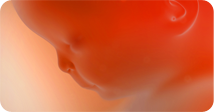
Baby's Growth and Development at 12 Weeks Pregnant
From the tiny details to major developments, your baby's growth continues with significant progress during your 12th week of pregnancy:
- When you’re 12 weeks pregnant, your baby is almost 3 inches long. That’s about the length of a plum.
- When you’re 12 weeks pregnant, your baby's facial features continue to become more defined, particularly his nose and chin.
- Tiny fingernails and toenails arrive for your baby when you’re 12 weeks pregnant.
- Your baby's heart might even speed up by a few beats per minute.
- By the 12th week of your pregnancy, your doctor might be able to hear your baby's heartbeat for the first time, using a special Doppler device. You can ask about this at your next prenatal visit.
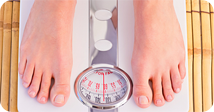
Your Changing Body at 12 Weeks Pregnant
Congratulations! You’re almost at the end of your 1st trimester. For most women, the next 12 weeks of pregnancy represent some of the most comfortable weeks. Many of your pregnancy's early discomforts, such as morning sickness and frequent urination, are declining or already are gone at 12 weeks pregnant. The pressure on your bladder might be gone as your uterus continues to expand upward.
- Hormones are still at work, but now your baby and your placenta are producing more estrogen and progesterone than your ovaries.
- While your increased blood volume will continue throughout your pregnancy, after the 12th week of pregnancy it might not increase as dramatically as it has in the early weeks. Your heart probably has adjusted already to the extra volume and is pumping faster now.
- Breasts might not feel quite as sore as they did a few weeks ago, although they still might feel heavy.
- Now showing: your baby!
- Through the 12th week of pregnancy, your uterus probably has continued to fit within your pelvis, making it difficult for those outside of your body to know you're pregnant, unless you've told them already.
- If you haven't started already, you might begin to show your pregnancy soon, as your uterus continues to expand.
- Your weight: By the 12th week of pregnancy, you might have gained about two to three pounds. Many doctors recommend that women already at a healthy weight gain 25 to 30 pounds during pregnancy, although it can be different for each individual. Speak with your doctor about what's best for you.

Wellness and Nutrition at 12 Weeks Pregnant
During the 12th week of pregnancy, exciting changes are continuing throughout your body. With these changes, you might be experiencing new challenges in your day-to-day care.
Constipation and its causes: What’s the digestion connection?
- When you're pregnant, the hormone progesterone causes digestion to slow down.
- This offers positive benefits for your baby, as your body has more time to absorb needed nutrients from the food.
- Your colon also is absorbing more water during pregnancy, which can cause harder stools.
Try these tips for controlling constipation:
- Eat fiber-rich foods.
- Drink plenty of fluids — at least eight glasses a day.
- Don’t forget the old favorites: Fruits and juices, especially prunes, continue to be effective remedies.
- Try smaller, more frequent meals.
- Add a little more activity to your exercise routine. Just an extra 10 minutes may offer the boost your system needs.
- Iron supplements sometimes can cause constipation. Try taking them with prune juice.
Gas and bloating also are common complaints in the early months of pregnancy. You unknowingly might be aggravating the situation by gulping air in response to nausea. Here are few tips to help:
- Eat slowly.
- Don't lie down right after eating. Give your food time to digestwhile you're still upright.
- If constipation persists, speak with your doctor about which medications are OK.
- Keeping constipation in check also will help with gas or bloating.




































